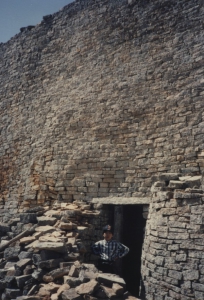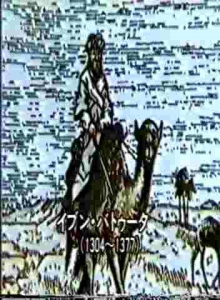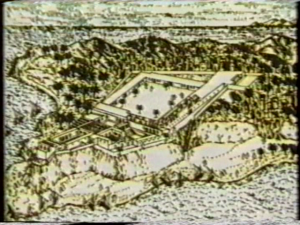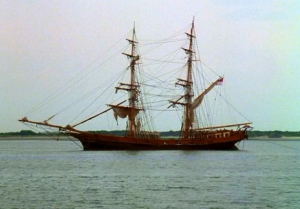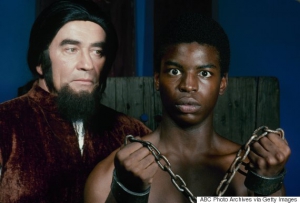アフリカ小史前半
概要
教養科目の英語の授業で使うための英文書『アフリカとその末裔たち』(Africa and its Descendants)の1章で、アフリカの歴史「アフリカの植民地化」("The colonization of Africa")を書きました。その前半で、ヨーロッパ人がアフリカ大陸に来る前のアフリカと奴隷貿易が中心です。
本文
アフリカ小史前半
ヨーロッパ人が来る前、アフリカ大陸ではたくさんの人が住んでいました。西アフリカのように大きな王国のある地域もあれば、小さな村単位で暮らしている地域もありましたが、自給自足の平和な生活を営んでいました。大陸には黄金を通貨にした大がかりな交易網が張り巡らされていて、遠くはインドや中国とも交易していました。
14世紀末にマルコ・ポーロが中国から持ち帰った火薬を元に銃を作り始めたヨーロッパは銃と聖書を携えて世界侵略を始めます。東アフリカで交易の中心だったキルワを1505年に滅ぼしたのはポルトガル人です。
その後、西アフリカで大規模な奴隷貿易を開始して侵略行為は激しくなって行きました。それまであった対等な関係は崩れ去り、富の偏りが出来ました。奪った側は生産の手段を手から機械に変えて、今の資本主義の方向に舵を切りました。殺すための武器も開発して、やがては原子力爆弾まで作りだしてしまいます。
アフリカ小史1の前半では、ヨーロッパ人が来るまでのアフリカ、ヨーロッパ人の侵略開始、奴隷貿易に絞って英文で書きました。日本語訳もつけた全文です。
『アフリカとその末裔たち』(Africa and its Descendants、2刷)
Chapter One: The Colonization of Africa 1章 アフリカの植民地化
PRECOLONIAL AFRICA 植民地化以前のアフリカ
Africa has been of great importance to the development of mankind. It has been found that the earliest beings able to make tools once lived in the Rift Valley in East Africa.
アフリカはこれまで人類の発展のためにとても重要でした。ごく初期の頃に道具を作るが出来た人たちが、かつて東アフリカのリフトバレー(大地溝帯)に住んでいました。
A big leap forward was taken when man learnt to sue iron for tools. Another big step was taken when cultivation started on a large scale. Large scale cultivation in Africa began in about 2000-3000 B.C. in both West Africa and Ethiopia.
人々が道具を作るために鉄を精錬するようになって、ひとつの大きな文明の飛躍がありました。大きな規模で耕作が始まって、更に飛躍を遂げました。約紀元前2000年から3000年頃、西アフリカとエチオピアの双方で、アフリカでは大規模な形での耕作が始まりました。
Between the years A.D. 700 and 1400 Europe developed rapidly. But for all this time European society was in many ways inferior to that of its African neighbours. Cairo was the foremost trade centre in the world and gold was used as the means of payment. Some of this gold was brought from West Africa, and some from Central Africa. The gold of Africa kept world trading going. World trade was stimulated by the spread of Islam. The gold from Zimbabwe was transported from the interior by Muslim middlemen to the African East Coast.
700年から1400年の間に、ヨーロッパは急速に発展しました。
しかその期間の間も絶えず、ヨーロッパ社会は様々な点で、近隣のアフリカ諸国よりも劣っていました。カイロは世界の最大の貿易拠点で、金が支払いの手段として使われました。このとき使われた金は、西アフリカや中央アフリカからきたものもありあました。アフリカからの金が世界の交易を発展させ続けました。世界貿易はイスラムの広がりによって刺激を受けました。ジンバブエからの金はイスラム教徒の仲買人によって内陸からアフリカの東海岸へ運ばれました。
ジンバブエの遺跡(長男、1992年9月)
In West Africa, too, long-distance trade gave birth to new and powerful societies. The West African kingdoms were ruled by kings who appointed local noblemen to collect taxes from the peasants.
西アフリカでは、また、長距離貿易が、新しくて強力な社会を生み出しました。西アフリカの王国は王によって統治され、王に指名された地方の貴族が農民から税を集めました。
Not only in West Africa, but also in Central Africa a centralized organization of society emerged on the basis of surplus production, trade and a growing population.
西アフリカだけでなく、中央アフリカでも、余剰生産と交易と人口増加を基礎にして、中央集権社会が現れました。
この頃の西アフリカの王国を訪れたイブン・バツゥータ(「アフリカシリーズ」より)
Parallel to the development of large kingdoms in Africa many groups of people learnt to control nature without kings and kingdoms. Their political systems may be called “village rule.”
アフリカでは、大きな王国の発展と併行して、多くの人々の集団は王や王国なしに自然を制御するようになりました。その人たちの政治制度は “村落共同体支配” と呼べるかも知れません。
In Africa, as elsewhere, migrations of cattle-raising people took place when they had to find new pastures, and new places to live for a growing population.
アフリカでは、他の所と同じように、人口が増えて新たな牧草地を探し、生活するための新たな土地を見つけなければならなくなった時、遊牧民の移住が始まりました。
THE FIRST COLONIALISTS 最初の植民地支配を目論んだ人達
Portuguese adventures were the first Europeans to 'discover’ Africa south of the Sahara. The first voyages along Africa’s west coast were little more than an extension of the piracy. The Portuguese took away people from the coasts they plundered and brought them home as slaves. As yet slave trade and economic exploitation were on a small scale.
ポルトガルの探検家がアフリカサハラ以南のアフリカを最初に「発見した」ヨーロッパ人でした。アフリカの西海岸に沿った最初の航海は、海賊行為の延長に過ぎませんでした。ポルトガル人は略奪行為を行なった海岸地域から人々を連れ去り、奴隷として母国に連れて帰りました。しかしそれでも、奴隷貿易と経済的な搾取の規模は小さなものでした。
They started to buy gold directly at the coast. In time they also wanted to find a sea route to India. Their aim was to take away from the city-state of Venice their control over the profitable spice trade with the East Indies.
ポルトガル人たちは海岸線で、直接金を買い始めました。やがてはインドへの海上ルートも発見したいと望んでいました。その人たちの目的はベニスの都市国家から、儲けの多い東インドとの香辛料貿易の支配権を奪うことでした。
Portugal wanted to start trade by exchanging goods with East Africa. But the project failed as the goods that Portuguese had to offer were inferior to those of the East African tradesmen. The Portuguese seafarers and merchants then decided to achieve for themselves the East African trade monopoly by force. With their superior arms the Portuguese managed to destroy the East African civilization.
ポルトガルは東アフリカと商品を交換することによって貿易を始めたいと思っていました。しかし、ポルトガルが持っていった商品が東アフリカの貿易商人の扱う商品よりも劣っていたために、その目論見は失敗しました。その時、ポルトガルの船乗りと商人は、武力を使って自力で東アフリカの貿易を独占しようと決めました。ポルトガル人は、優れた武器を使って辛うじて東アフリカの文明を破壊することに成功しました。
東洋貿易の中心として栄えていたキルワの復元図(「アフリカシリーズ」より)
In Western history Vasco da Gama, d’Almeida, and Tristan da Cunha have been estimated as “great discoverers,” but they were nothing but destroyers for Africans. A Germany who was present when d’Almeida destroyed Kilwa gives us the following eyewitness report:
“In Kilwa there are many strong houses storeys high. They are built of stone and mortar and plastered with various designs. As soon as the town had been taken without opposition, the Vicar-General and some of the Franciscan fathers came ashore carrying two crosses in procession and singing Te Deum. They went to the place, and there the cross was put down and the Grand-Captain prayed. Then everyone started to plunder the town of all its merchandise and provisions. ”
西洋の歴史では、ヴァスコダ・ガマやダルメイダやトゥリスタオ・ダ・クンハはこれまでずっと「偉大な発見者」として評価されて来ましたが、アフリカ人にとってその人たちは破壊者以外の何ものでもありませんでした。ダルメイダがキルワを破壊した時に立ち会ったあるドイツ人は、次のような目撃証言をしています。
キルワでは2階や3階の高いしっかりとした家がたくさんあります。家は、石とモルタルと漆喰で出来ていて、様々な模様をしています。町が抵抗もなく占領されるとすぐに、司教総代理と何人かのフランシスコ会の神父が上陸をして、一列になって十字架を運び、賛美歌を歌いました。それからその場所に行き、十字架が降ろされ、総督が祈りをささげました。それから、その町の全ての商品と食料品を略奪し始めました。
Two days later the city was set on fire.
2日後、街に火をつけました。
The main interest of these first colonialists was in spices, cloth, gold, and ivory. They dominated the sea but on land only some narrow strips of the coast. Other countries soon began to compete with the Portuguese for the trade with the East; first the Dutch, then the English and the French gained control over this rich trade.
こうした植民地支配を目論んだ人達の主な関心は、香辛料と布と金と象牙でした。その人達は海を支配しましたが、陸では海岸線の岸の狭い僅かな地域を支配しただけでした。やがて他の国々も東洋との貿易を求めてポルトガルと競争をし始めました。最初にオランダ、次にイギリスとフランスがこの豊かな貿易の支配権を手にすることになりました。
THE SLAVE TRADE 奴隷貿易
The European conquest of South America suddenly changed the character and importance of the slave trade. With brutal force the prospering cultures of Peru, Bolivia and Mexico were stamped out by the Spanish conquerors and their silver and gold were stolen. Many Spaniards who set out for this Eldorado found no metals but settled as farmers.
ヨーロッパ人が南アメリカを支配したことで、奴隷貿易の特徴と重要性が一変しました。ペルー、ボリビア、メキシコの繁栄した文化はスペインの侵略者に力ずくで踏みにじらされ、金や銀が盗まれました。理想郷を求めて出発したスペイン人たちは金銀を見つけられませんでしたが、そのまま住み着いて農民になりました。
In 1518 a Spanish ship brought the first cargo of Africans directly from Africa to America. This was the start of a trade in slaves which was to continue for three and a half centuries and to bring millions of Africans to America.
1518年、スペイン船が初めてアフリカ人の積み荷を直接アフリカからアメリカに連れて行きました。これがその後3世紀半にも渡って続き、何百万人ものアフリカ人をアメリカに連れ出すことになる奴隷貿易の始まりでした。
The merchants’ profits and the products from America were exchanged in Europe for guns and cloth which were brought to Africa and exchanged for slaves. These humans were sold in America where they produced the goods to be brought to Europe. This was the so-called “triangle trade.” The riches of the capitalists grew while Africa suffered.
奴隷商人の利益と、アメリカからもたらされた産物は、ヨーロッパでアフリカへ連れて行かれて奴隷と交換される鉄砲や布に交換されました。これらの人間はアメリカで売却され、そこでヨーロッパに運ばれる商品を作り出しました。これが所謂「三角貿易」でした。資本主義者たちの富が増えて、アフリカが被害を受けました。
European, above all English and American capitalists had gained enormous profits from the trade in slaves and the work performed by the slaves. Slavery was an essential part of the international capitalist market. By this trade the first large-scale collection of wealth was accumulated to speed up the development towards capitalism. The “triangular trade” was one of the foundations of the Industrial Revolution in Europe.
ヨーロッパ、とりわけ、イギリスとアメリカの資本家たちが奴隷貿易と奴隷が行なう労働から莫大な利益を手に入れました。奴隷制は国際資本市場で重要な役割を担っていました。この貿易によって、大規模な初期の富の集積が行なわれ、資本主義への発展の速度を加速させました。「三角貿易」はヨーロッパの産業革命の基礎の一つでした。
奴隷を運んだ帆船(「ルーツ」より)
For Africa the consequences of the slave trade were ruinous, not only in the terms of the boundless suffering of the millions who were taken as slaves, and their descendants, but also for those left behind.
アフリカにとって、奴隷貿易によってもたらされたものは、奴隷として連れ出された何百万もの人々とその子孫の際限ない苦しみという意味だけではなく、後に残された人たちにとっても、壊滅的でした。
<Reference 1> An excerpt from Roots <参考文献 1>「ルーツ」からの抜粋
We can find an example of the slave trade from the following scene of the American film Roots which hints to us what the slave trade was like.
アメリカ映画「ルーツ」の次の場面を見てみましょう。奴隷貿易がどんなものであったか、その一端を窺い知るが出来ます。
(30周年DVD版「ルーツ」のカバー)
In this scene Captain Davies (D) of the slave ship talks with a slave trader John Carrington (C) in his cabin after his ship landed the North America:
この場面では、奴隷船が北アメリカに着いた後、
デイヴィス(D)船長が船室で貿易商人のジョン・キャリントン(C)と次のような会話を交わしています。
C: Did you have a good voyage, Captain?
D: My first officer is dead, ten seamen and the ship’s boy, . . . more than one third of my crew.
C: Oh well, God rest their souls. But the life blood of commerce is goods, sir, goods. How fares your cargo through the passage, Captain?
D: Three thousand elephant teeth have survived the voyage.
C: You’re a pretty wit, sir, a pretty wit . . . elephant teeth indeed . . . .
D: One hundred forty Negroes were loaded aboard the Lord Ligonier at the mouth of the Gambia River.
C: Oh. A loose pack. Well . . . .
D: Of those, ninety-eight were alive when we made port.
C: Ninety eight. Oh, less than a third dead. I have known slavers to make port with less half surviving and still show a handsome profit. My fericitations, Captain.
D: How soon can I unload?
C: Directly we warp your vessel to the wharf.
D: I want you to secure for me flowers of sulphur to burn in the hold. I wish to see my ship clean again.
C: Oh, naturally, sir. After all you’ll be carrying tobacco to London.
D: And in London . . . .
C: Trade goods for the Guinea Coast, and then on to the Gambia River.
D: And more slaves . . . .
C: Indeed, sir. Thus does heaven smile upon us, point to point in a golden triangle. Tobacco, trade goods, slaves, tobacco, trade goods and so on ad infinitum. All profit, sir and none the loser for it.
D: Tell me, Mr. Carrington, do you ever wonder . . . .
C: On what topic, sir, to what end?
D: As to whether or not we are just as much imprisoned as are those chained in the hold below?
C: I do not follow your meaning, sir.
D: It sometimes feels that we do harm to ourselves by taking part in this endeavor.
C: Harm? What harm can there be in prosperity, sir? What harm is a full purse, I’d like to know.
D: No, no, I doubt that you’d like to know, Mr. Carrington. I doubt that either of us would truly like to know.
C: Would you be interested in coming to the auction, Captain? I warrant you’ve never seen anything like it.
D: No, I am sure I have not, Mr. Carrington. I do know that I am not interested in seeing it now . . . or ever.
船長とクンタ・キンテ(「ルーツ」より)
カリントン(C)「船長、船旅はうまく行きましたかね?」
デイヴィス(D)「一等航海士と船員が十人、それにボーイが一人……、私の乗組員のうち三分の一以上が。」
C「おう、それはお気の毒に、その人たちの魂に神の御加護がありますように。しかし、貿易の大元は何と言っても商品ですからね、商品ですよ。ところで船長、海の上では積み荷の加減はどうでしたかね?」
D「船旅では三千本の象牙が何とか事なきを得ましたよ」
C「船長、冗談がとてもお上手ですな、とてもお上手で……三千本の象牙とは……」
D「ガンビア川の河口で、百四十人の奴隷をロード・リゴニア号に乗船させました」
C「それは、ゆったりとした積み方で。それで……」
D「そのうち、港に着いたときの生き残りは九十八人でした」
C「九十八人。そうですか、それでは、死んだのは三分の一以下ですな。入港した時に、生き残りが半分以下でも、まだかなりの利益があった奴隷商を私は何人も知っておりますよ。おめでとうございます、船長」
D「一刻も早く積荷を下ろしたいのですがね」
C「直ちに船を曳いて行って、岸壁にお着けしましょう」
D「船倉で燃やす硫黄の粉をぜひご用意いただきたい。もう一度、きれいになった船が見たいのです」
C「それは、もう、船長。それから、船長はまた、ロンドンへ煙草を運んで行かれることになりますね」
D「そして、ロンドンで……」
C「ギニア海岸向けの貿易の品を、それから、またガンビア川に向けて」
D「そして、もっとたくさんの奴隷を……」
C「その通りですよ、船長。かくして天は我らにほほ笑みかけ、黄金の三角で点と点を結ぶ。煙草、貿易の品、奴隷、煙草、貿易の品など、永遠に限りなく。誰もが得をして、損するもの誰もなし、ですよ」
次回は「アフリカ小史後半」です。(宮崎大学医学部教員)
執筆年
2013年11月10日
収録・公開
→「アフリカ小史前半」(No. 63 2013年11月10日)

